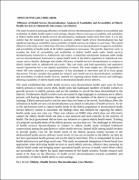| dc.description.abstract | ODWE DENNIS (2012-M092-20039)
Efficiency of Health Service Decentralisation: Analysis of Availability and Accessibility of Elderly Health Services in Adekokwok Sub-county, Lira District.
The study focused on assessing efficiency of health services decentralisation in relation to accessibility and availability of elderly health needs in rural settings. Despite efforts to increase accessibility and availability of elderly health needs in health services decentralisation, inadequate studies have been done. It is in this context that the researcher was prompted to ascertain whether health service decentralisation has had significant bearing on availability and accessibility of health services for elderly in rural areas. The overall objective of the study was to determine efficiency of health services decentralisation in regard to availability and accessibility of health needs of the elderly population in rural areas. The specific objectives were; to examine the level of accessibility and availability of elderly health needs under health services decentralisation framework in Adekokwok sub-county, to determine mechanisms instituted under health services decentralisation framework to capture health needs of the elderly population in Adekokwok sub-county and to identify challenges that hinder efficiency of health services decentralisation in relation to elderly health needs in Adekokwok sub-county. This case study used both quantitative and qualitative research approaches but it was majorly quantitative in nature. The study sample was 138 respondents of which 100 were subjected to a questionnaire, 10 key informants to interviews and 28 to focus group discussions. The key variables that guided the research were; health services decentralisation, availability and accessibility of elderly health services, methods for capturing elderly health services and challenges affecting availability of elderly health needs in decentralised health service delivery.
The study established that while health services were decentralised, health units were far from elderly persons to easily access them, health units had inadequate numbers of health workers to provide services to elderly persons and yet the mandate to recruit has been decentralised to the districts. Furthermore, health workers were not trained in sign languages to communicate to elderly persons with hearing impairments--these are all under the mandate of the district to arrange such trainings. Elderly persons had to wait for more than two hours to be served. Such delays affect the utilisation of health services yet decentralisation was aimed at utilisation of health services. As far as the mechanisms used to capture health needs of the elderly population in decentralised health service delivery system is concerned, the findings show that methods for capturing the elderly health needs were not clear cut. There was reliance on HMIS data which does not effectively capture the elderly health needs and data is also analysed and used centrally by the ministry of health. The local government did not have any initiative to capture elderly health needs. Training of caregivers on health needs of the elderly persons was not done yet. The challenges to efficiency of health services decentralisation in relation to elderly health needs included traditional conservatism among the population to utilise health services, limited skills among health workers to provide quality care for the health needs of the elderly persons mainly because in the decentralised health service delivery lower levels of care are accessible to the elderly yet they do not have specialised health persons and yet the elderly need them. This is compounded by lack of health infrastructure and drugs stock outs. This study recommends integration of home based care approaches when delivering health services to reach elderly persons, effective data capturing on elderly health needs and bringing nearer specialised health services at health centre threes which are accessible to the elderly for quick interventions by the health workers. Further research still needs to be done on the efficiency of health service decentralisation towards availability and accessibility of elderly health needs in rural settings.
Key Words: Elderly, Health Service Decentralisation, Lira District. | en_US |


